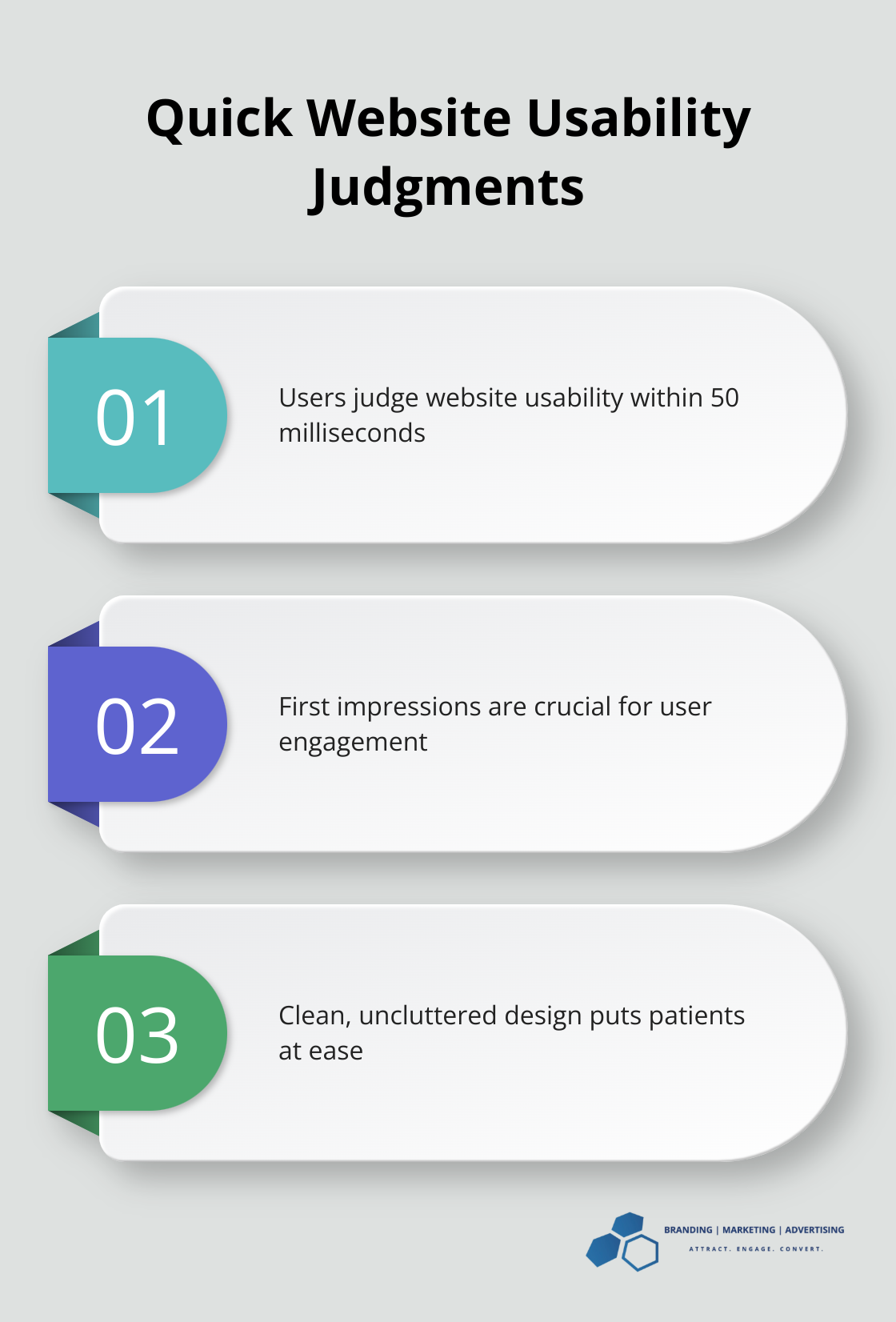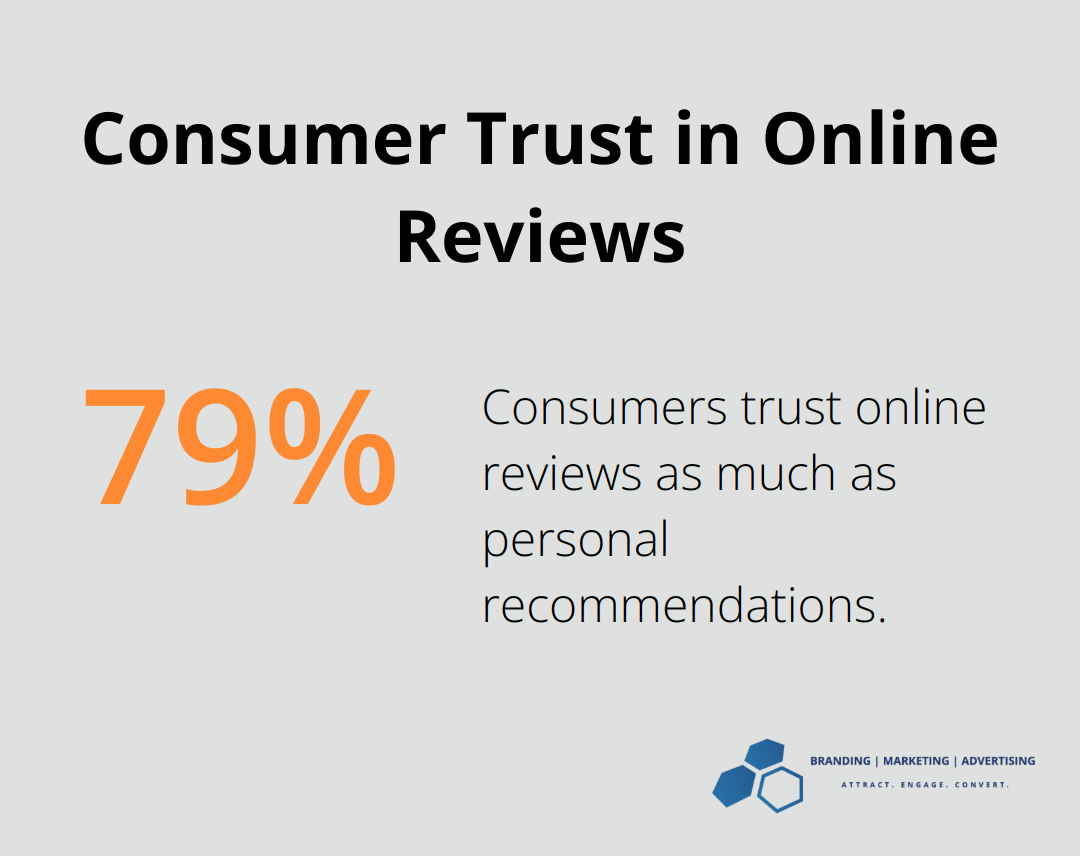Designing an Engaging Website for Your Psychiatry Practice
At Branding | Marketing | Advertising, we understand the importance of a well-designed psychiatry website for mental health professionals.
A thoughtfully crafted online presence can help you attract new patients, build trust, and showcase your expertise. In this blog post, we’ll explore the key elements of an effective psychiatry website and provide practical tips for creating compelling content.
We’ll also cover essential strategies for optimizing your site to improve its visibility in search engine results, helping potential patients find your practice more easily.
What Makes a Psychiatry Website Effective?
A well-designed psychiatry website attracts and retains patients. We at Branding | Marketing | Advertising have identified key elements that create a truly effective psychiatry website.
Create a Welcoming Homepage
Your homepage acts as the digital front door to your practice. It must convey professionalism and warmth immediately. Use calming colors like soft blues or greens (associated with healing and tranquility). Include a clear, concise mission statement that outlines your approach to mental health care.
A study by the Nielsen Norman Group revealed that users judge a website’s usability within 50 milliseconds. Make those milliseconds count with a clean, uncluttered design that puts patients at ease.

Simplify Navigation
Patients seeking mental health services often feel stressed or anxious. Don’t complicate their experience with confusing navigation. Implement a simple, intuitive menu structure that allows visitors to find information quickly.
Try to limit your main navigation to 5-7 items. Include essential pages like “Services,” “About Us,” “Contact,” and “Resources.” A search function can also help users navigate larger sites with extensive content.
Showcase Your Expertise
Your “About” page and therapist bios build trust. Highlight your qualifications, experience, and approach to treatment. Use professional headshots and write in a warm, approachable tone.
Detail Your Services
Clearly outline the services you offer and any specialties. Use layman’s terms to describe different types of therapy or treatment approaches. Consider creating separate pages for each major service, which can also boost your search engine visibility for specific treatments.
Include information on what patients can expect during their first visit. This transparency can alleviate anxiety and increase the likelihood of new patient bookings.
Your website often provides the first point of contact for potential patients. These elements don’t just create a website – they extend a digital handshake to those who need your services. The next section will explore how to create compelling content that engages visitors and showcases your expertise.
How to Create Compelling Content for Your Psychiatry Website
Creating engaging content for your psychiatry website attracts and retains patients. Quality content transforms a website from a simple online presence into a valuable resource for both current and potential patients.
Educate Your Audience
Educational blog posts on mental health topics showcase your expertise and provide value to your readers. Using long-tail keywords is a crucial strategy for therapists to improve their search engine rankings and attract more targeted traffic to their website.
Focus on topics relevant to your practice and address common patient concerns. Write about “5 Strategies for Managing Anxiety” or “Understanding the Link Between Diet and Depression.” Use clear, jargon-free language and structure your posts with subheadings and bullet points for easy readability.
Provide Valuable Resources
Your website should function as a hub of helpful information for your patients. Create a resources section with self-help tools, recommended reading lists, and links to reputable mental health organizations. Consider developing downloadable worksheets or guided meditation audio files.
A poll conducted by Ipsos on behalf of NAMI finds that most teens are comfortable talking about mental health, but often don’t start the conversation. Providing these resources positions your practice as a trusted source of information.

Address Common Questions
A well-crafted FAQ section saves time and provides immediate answers to potential patients. Include questions about your treatment approaches, insurance acceptance, appointment scheduling, and what to expect during the first visit.
Update your FAQ regularly based on questions you receive from patients. This improves user experience and can boost your SEO by addressing long-tail keywords that people might search for.
Showcase Patient Success Stories
Patient testimonials and success stories build trust and credibility. A study by BrightLocal found that 79% of consumers trust online reviews as much as personal recommendations.

When sharing patient stories, prioritize privacy and obtain proper consent. Focus on positive changes and outcomes rather than specific treatment details. You might share a story about how a patient overcame social anxiety and advanced in their career.
Regular content updates keep your website fresh and relevant (Google favors websites that consistently publish new, high-quality content). These strategies create a website that attracts new patients and serves as a valuable resource for existing ones. The next step involves optimizing your website to ensure it reaches your target audience effectively.
How to Optimize Your Psychiatry Website for Search Engines
Search engine optimization (SEO) plays a vital role in ensuring your psychiatry website reaches potential patients. Effective SEO strategies can significantly increase visibility and patient acquisition for mental health professionals.
Conduct Thorough Keyword Research
Identify the terms and phrases your potential patients use when searching for mental health services. Tools like Google Keyword Planner or SEMrush help discover relevant keywords. Focus on long-tail keywords specific to your services (e.g., “cognitive behavioral therapy for anxiety in [your city]” or “depression treatment options for teens”).
Strategically incorporate your target keywords into your website’s content, meta descriptions, and headers. Avoid keyword stuffing, as this can negatively impact your search rankings.
Implement Local SEO Tactics
For psychiatrists, local SEO holds particular importance as most patients seek care within their immediate area. Claim and optimize your Google Business Profile, ensuring all information is accurate and up-to-date. Encourage satisfied patients to leave reviews, which can significantly boost your local search visibility.
Include location-specific keywords throughout your website (such as “[Your City] psychiatrist” or “mental health services in [Your State]”). Create separate pages for each location if you have multiple offices.
Prioritize Mobile-Friendliness and Site Speed
With over 60% of searches now conducted on mobile devices, a mobile-friendly website is essential. Google prioritizes mobile-friendly sites in its search results, so ensure your website responds well and navigates easily on smartphones and tablets.
Site speed also plays a crucial role in SEO. A study by Portent found that the first five seconds of page-load time have the highest impact on conversion rates. Use tools like Google’s PageSpeed Insights to identify and address any issues slowing down your site.
Build Quality Backlinks
Backlinks from reputable websites signal to search engines that your site is trustworthy and authoritative. Seek opportunities to guest post on mental health blogs, participate in industry forums, or contribute to local news outlets. These activities not only build valuable backlinks but also establish you as an expert in your field.
SEO requires ongoing effort. Update your website regularly with fresh, relevant content and stay informed about the latest SEO best practices. These strategies will improve your website’s visibility in search results, making it easier for potential patients to find and choose your practice.
Final Thoughts
A well-designed psychiatry website requires careful planning and execution. It serves as a digital front door to your practice, welcoming potential patients and providing valuable resources. Professional design, intuitive navigation, and informative content build trust and showcase your expertise.
Compelling content and search engine optimization form the foundation of a successful psychiatry website. Educational blog posts, patient resources, and thoughtfully crafted FAQs provide value to visitors and improve search rankings. Patient testimonials (when handled with proper consent) can powerfully build credibility.
At Branding | Marketing | Advertising, we specialize in creating effective digital marketing strategies for mental health professionals. Our team can help you develop a psychiatry website that looks great, performs well in search results, and converts visitors into patients. We support your online presence to help your practice thrive in the digital landscape.












